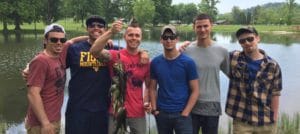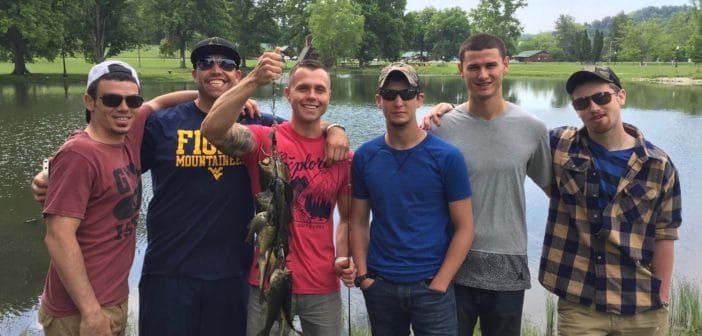 The state of West Virginia is arguably ground zero for our nation’s opioid epidemic. Oh, did you know this country had an opioid epidemic? If not, it’s only every other news story on this site. Anyway, the West Virginia statistics are staggering. There are 34 overdose deaths per 100,000 people. The national average is 13 deaths per 100,000. The fact that there is a “national average” for drug overdoses per chunks of people is alarming in itself. But according to the Department of Health and Human resources, in 2014, 628 West Virginia residents died as a result of overdose complications, namely from heroin and Oxycontin. The state is facing a dark reality but there could be a small pillar of hope from a very unconventional source.
The state of West Virginia is arguably ground zero for our nation’s opioid epidemic. Oh, did you know this country had an opioid epidemic? If not, it’s only every other news story on this site. Anyway, the West Virginia statistics are staggering. There are 34 overdose deaths per 100,000 people. The national average is 13 deaths per 100,000. The fact that there is a “national average” for drug overdoses per chunks of people is alarming in itself. But according to the Department of Health and Human resources, in 2014, 628 West Virginia residents died as a result of overdose complications, namely from heroin and Oxycontin. The state is facing a dark reality but there could be a small pillar of hope from a very unconventional source.
Treating the Mind By Minding the Farm
Can some of the people struggling with alcoholism and addiction find salvation in West Virginia’s dirt? Yes, we mean the kind of the ground variety, the stuff making up the soil. Eastern philosophy has long maintained that one of the best ways out of the mind (the “mind” being that terrible mental torture chamber most addicts are perpetually stuck in) is through meditation—and staying present while doing stuff, whether it’s washing dishes or raking leaves. Western culture is starting to catch on in cliche ways (picture a Caucasian woman carrying a yoga mat while checking her smart phone and drinking Starbucks) but how do mindfulness and meditation apply to the addiction recovery world? Brand new West Virginia entity Jacob’s Ladder aims to show you.
Jacob’s Ladder is West Virginia’s newest long-term residential recovery facility for young men (18 and up). It aims to combine traditional 12-step principles with other holistic approaches to sobriety—namely mindfulness, music therapy, art therapy, adventure therapy, and, perhaps most unique, a fully-immersive farming community. From feeding the chickens to repairing tractors, residents certainly won’t be watching the sunrise because they’re stumbling out of a bar anymore. Through the aforementioned activities, 12-step facilitation and Mindfulness Based CBT the team at Jacob’s Ladder wants to bring about a spiritual awakening—a visceral shift in the way its clients see the world. It’s a chance for them to wake up, so to speak, and to do so free from self-absorption.
The team at Jacob’s Ladder believes the combination of mindful practices like farming with AA/NA recovery principles is the key to creating a reliance on something other than the client’s own brain. The two approaches to recovery might have different semantics and language but they definitely aren’t in conflict. We spoke to LADC and Jacob’s Ladder Program Director, Craig Cohen, who said, “What I believe makes an addict an addict is a sense of estrangement or alienation. Most of them live in their mind and the eschewed belief systems their mind puts them in. A lot of people are resistant to the idea of steps because it’s theistic and faith based. How do we make it palatable? Can we back door them into it? When they come in they work steps and acknowledge they have a problem and then we try to give them solutions. It’s a multi-phase system; they’re relatively autonomous by the time they leave.” Of course, this doesn’t happen overnight.
Planting a Seed and Watching It Grow
The field of addiction treatment is still very young and the 30-day “dry-out” mentality is basically the result of insurance companies dictating what they will and won’t cover, and for how long. Many experts argue the habituated behavioral and thought patterns involved in alcoholism and addiction aren’t rerouted in 30 days. That’s why the program at Jacob’s Ladder is a minimum of six months. The extended length of stay is also intended to make up for the fact that there is rarely a solid aftercare plan built into the average program.
A Good Reason to ‘Run for the Hills’
Jacob’s Ladder teaches positive regard for self, others and the earth. Everyone is expected to stay on top of both household and farming obligations while in the program. This is in addition to just straight up learning how to have fun again without mind-altering substances. Farming may be manual labor but this place definitely isn’t all work, no play—unless rafting and hiking count as work in your book?
Education is also part of the game plan here as Jacob’s Ladder is affiliated with major research institute West Virginia University. It has formalized a relationship with WVU Medicine, which supports the program with psychology and therapy services, especially for men with co-occurring issues. And if necessary, clients can go there to access detox services before they start toiling the fields or operating any heavy machinery.
West Virginia is drowning in addiction and the devastating result of that proves the status quo treatment system isn’t exactly cutting it. Jacob’s Ladder founder Dr. Kevin Blankenship’s mission is to help people by providing a beacon of compassionate community in the hills of The Mountain State. The key word here being “community”—a sense of the greater good, and something bigger than one’s self.
It’s arguably as groundbreaking a way to approach sobriety and recovery as the ground Jacob’s Ladder residents are breaking. As Program Director Cohen points out, “You can’t have great meditation practice and a community of jerks.” True that.
Want to learn more about Jacob’s Ladder? Reach Jacob’s Ladder by phone at (304) 239-1214 or by email at info@jacobsladderbrookside.com. Find Jacob’s Ladder on Facebook
Photo provided by Jacob’s Ladder. Used with permission.
Sponsored DISCLAIMER: This is a paid advertisement for California Behavioral Health, LLC, a CA licensed substance abuse treatment provider and not a service provided by The Fix. Calls to this number are answered by CBH, free and without obligation to the consumer. No one who answers the call receives a fee based upon the consumer’s choice to enter treatment. For additional info on other treatment providers and options visit www.samhsa.gov.




